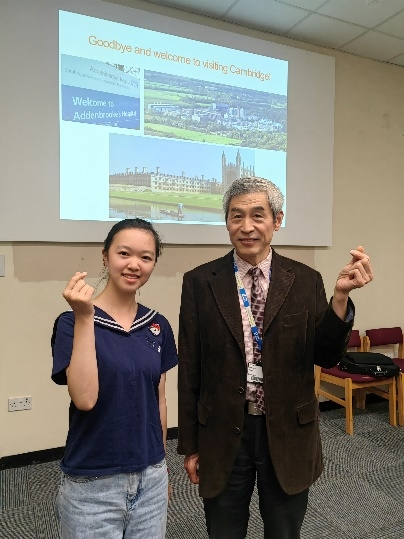A second year clinical medicine student from Ningbo University
During my study programme here, I always think of practicing reflective study as events here vary and I am eager to draw a curriculum.
At the beginning of the courses, I was quite intense about language barriers and contents of courses. However, I found problem-based learning as the real challenge when I finally involved into the class. It’s probably due to different teaching style and learning-testing pattern in China. Apart from my learning experience in my laboratory team, I don’t always ask something innovative for new ideas and concepts and mainly receive new knowledge instead. Later I realized that it’s not what Professors pour into our heads that matters. It’s the links that we are finding and establishing between what we know and new take-ins and what we want to add into our knowledge system that truly matter for university study life. When I was asking questions, there is actually a basket of different answers waiting to be demonstrated. Thanks to professors, especially Dr. Smith, my problems were perfectly and logically solved by their professional and elaborate explanations, which really ignited my motivation and passion for my further study. There is an old Chinese saying goes, " Thoughtless learning cause recklessness, while unpracticed thinking cause perilousness." The instinct of learning is carved in humanitarian. And learning is motivated by questioning both ourselves and others from previous to superior problems. As it's known to everyone that medical career is a lifelong study career, it's rarely important to manage PBL learning and keep the curiosity for the unknown.

Another prospect that I really want to discuss and reflect on is a philosophy mentioned continually by almost all the professors. That is, we have to do 'Personalized Medicine' or follow 'deliberative and interpretative model' and fully respect patients' choices. Apart from good communication skills and 'lain language' that we use to talk with patients, what can we do if patients actually make a wrong decision on impulse regardless of any exhort ? Do unprofessional public exactly know what is the 'right' or possible choice? What can we do when patients insist on requiring impossible treatment? I don't know much about current average educated level in the UK. But I can't help thinking about the situation in China. The average educated level of people in China is not high enough for most of the people to understand what doctors talk about even with the plainest words. There are always a lot of people arguing for better treatment and neglect the real situation that patients are facing. In fact, they don't want to listen to any explanation at all. I didn't figure out the main cause for the dilemma that we are facing , but I think it has something to do with the large population in China. The situation is that, wealthy people often have their personal 'GPs', while the main population, which is about numerous patients, come to the limited doctors and hospitals directly for help. We can't afford such a big budget for everyone's primary medical care. So it's both really hard for doctors to make smiling face and for patients to carefully listen to suggestions. I don't know what the government do to release medical stress, but I agree that during my medical training, I should try my best to improve my communication skills and manage my professional attitude even being wornout. After all, the relationship between medical workers and patients (and their families) is actually a kind of contract relationship between two groups of people. When one is in relationships, communication is the best and perhaps the only way to achieve good results. 'Human nature is the sum of all social relationships.'

I joined a laboratory last semester. During my study of different discovered mechanism and proteins and plenty of experimental skills, the question 'what can I do for clinical medicine and patients after I acquaint all these things' bordered me a lot. After taking the academic courses like microbiology techniques applied in clinical medicine in School of Clinical Medicine , University of Cambridge, I will focus on the current dilemma that patients are facing and try my best to apply my research to clinical cases.
Apart from meaningful academic life here, I enjoyed good time with nature and new friends here in addition. Again, I'd like to convey my sincere gratitude to all the professors!






